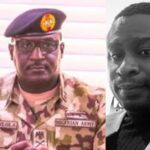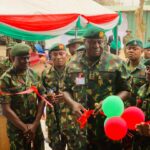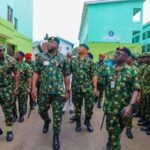By Augustine Ehikioya
Rising from the ruins of war against insurgents in over a decade, the military has said that Maiduguri, Borno State is very safe.
The insurgency war waged by Boko Haram sect has not only sent many Nigerians to their early graves, but made many residents to flee the State and become refugees in other parts of the Nigeria and some neighboring countries.

In an exclusive interview with Security Watch Africa (SWA) in his office in Maiduguri, Borno State capital, the Theatre Commander, Joint Task Force, North East Operation HADIN KAI, Major General Christopher Musa, said normalcy has returned to Maiduguri.

He said “The reports so far has remained peace is back in Maiduguri, Borno State and generally in the North East. And we will continue to ensure that we conduct operations that everyone is peaceful, everywhere is peaceful and everyone is happy.
“If you go round the town, you will see a lot of activities are back, you can’t even believe this is Maiduguri, because everything is back to normal.”
Asked if the peace is real and will not be threatened again, he said “It’s not a fluke. This is for real. Everyone’s hand is on to ensure we sustain and improve. The Chief of Army Staff started it to this stage, I took over from him as the Theatre Commander. And we are doing everything possible to ensure that we have total peace.
“Though it’s difficult to have total peace, but with such that life and normalcy is restored in Maiduguri. And it’s obvious that sometimes during holidays, you can’t even get air ticket to Maiduguri or go back because everywhere is fully booked.
“We have three airlines that are coming in, one is already on the way, which means we have up to four, and that is on daily basis. If it is not safe, they won’t be there. Schools are on within, and everyone is going back to his normalcy. So, I think we have a level of peace,” he added.
On whether the people have now retuned to farming as a signal for peace in the area, he said “They are back to farm, now they are working towards the harvest session. We are lucky that the rain is still falling till date. With the rainfall this year, I’m sure there will be enough food.
“We are providing security in conjunction with the Civil Defence and the Agro Rangers, the Civil Police, we have troops in areas they are cleared to farm. So, I think, this year, we are going to have bumper harvest,” he said.
He also spoke about other projects the military is involved in in the areas apart from fighting terrorists.
“We have been in service for so long and these are things that we do gradually wherever we are because the military is such, apart from the fight, we have the non-kenotic aspect of building societies, building communities, because we realized that our efforts should be to make our communities happy.
“And the only way we can make them happy is not only keeping them secured, but to provide them some amenities they might need. Sometimes, you see us doing medical outreaches, provide water in some areas, even teachers at schools, we do all those things.”
He also said that a lot of communication gaps between the military and the Borno State government have been closed.
This, he said, has been responsible for the cordiality presently been witnessed between the two parties.
He said “I think there is a better understanding on the process. You know there are some military operations, some times, impinge on other activities of government, and if there is no understanding. Now we communicate a lot. The government let us know what their plans are, and we tell them what our plans are, and we find a common ground that we move together.
“And there is mutual respect between both parties and I think it has made a lot of things easier. This started right when the Chief of Army Staff was the Theatre Commander. What we try to do is to build on it. I think the good thing is that we have seen sincerity of purpose in what we are doing.
“We are not competing with anybody, we are not politicians. We are just military men trying to do our own work. And military operation is just one line to the operations to the peace effort. It’s just about 25%, so the rest you can imagine is part of what the government is to do,” he said.







